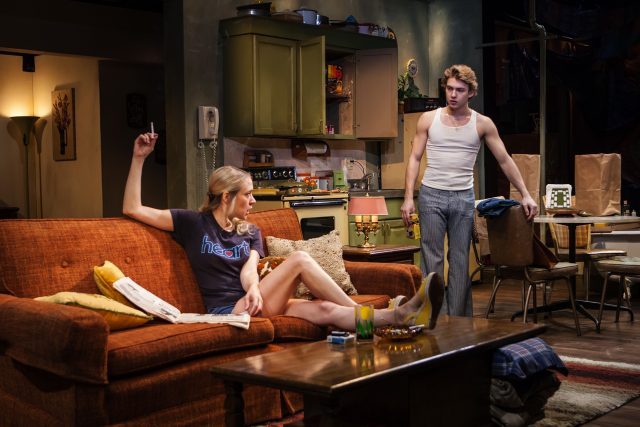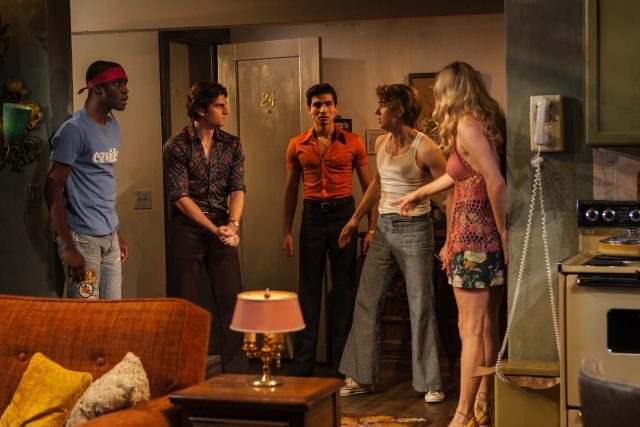
A drug-addict mother (Chloë Sevigny) and her troubled son (David Levi) prepare for battle in Downtown Race Riot (photo by Monique Carboni)
The New Group at the Pershing Square Signature Center
The Romulus Linney Courtyard Theatre
480 West 42nd St. between between Ninth & Tenth Aves.
Tuesday – Sunday through December 23, $20-$100
www.thenewgroup.org
www.signaturetheatre.org
Not a whole lot of the New Group world premiere of Seth Zvi Rosenfeld’s Downtown Race Riot makes sense. Continuing through December 23 at the Signature Center’s Romulus Linney Courtyard Theatre, the one-act play, set in an apartment in Greenwich Village in 1976, is dominated by its long, deep set by master designer Derek McLane, which stretches across the space, consisting of, from left to right, a bedroom, a living room / kitchen with a small cast-iron clawfoot tub, and another bedroom. The center section juts one row into the audience, assuming added intimacy, while many of the seats in the left and right sections offer limited, sharply angled views that require patrons to stretch their bodies to try to see what’s going on, which is not really that much, as most of the action takes place center stage. Oddly, many people in the first row placed their drinks and even a bag or hat on the stage itself while waiting for the rest of the crowd to enter; one of the theater employees had to tell them that doing that was a no-no. The individual rooms are splendidly decorated, with one bedroom filled with pictures and posters of 1970s celebrities and music groups, the kitchen capturing the feel of the schlocky era, and the far bedroom a tribute to a former flower child. I realize that I’ve gone on at length about the set, primarily because it’s the most interesting part of the play; the story, inspired by an actual 1976 riot in Washington Square Park, is slack and uninvolving, with unlikable characters and questionable plot developments.

New Group world premiere looks at real 1976 riot in Washington Square Park (photo by Monique Carboni)
Chloë Sevigny plays Mary Shannon, a thirty-nine-year-old drug addict and single mother living on disability and constantly coming up with new scams to bring in money. Her twenty-one-year-old daughter, Joyce (Sadie Scott), is a lesbian who is looking to move out, while her eighteen-year-old son, Jimmy, known as Pnut (David Levi), has no big plans except for hanging out. His best friend is Marcel “Massive” Baptiste (Moise Morancy), a Haitian American considered an acceptable black; Pnut is also acquainted with Italian troublemakers Jay 114 (Daniel Sovich) and Tommy-Sick (Cristian DeMeo). Later the family is visited by lawyer and former hippie Bob Gilman (Josh Pais), who just confuses the story, which takes place during one endless day as Joyce comes on to Massive, Pnut makes hamburgers, Mary shoots up, and the teenage boys get ready to hurt some people in the park. “The whole neighborhood is goin’ out there with pipes and bats and it’s open season on yans and piss-a-ricans,” Pnut tells his mother, who replies, “Are you demented? Did I bring you up to be a KKK member? We’re in Greenwich Village, for chrissakes. This is where people come to be free.” (There is also plenty of hatred for gays and Jews.) Director Scott Elliott, the New Group’s artistic director who recently helmed terrific productions of Mercury Fur, Evening at the Talk House, and The Whirligig, can’t do much with Rosenfeld’s (The Flatted Fifth, The Get Down) muddled, stilted dialogue or the inefficient acting, although it is a treat to see Oscar nominee Sevigny so up close and personal — she previously appeared onstage with the New Group in 1998 in Hazelwood Junior High and two years later in What the Butler Saw. And as fab as McClane’s set is, it ends up only adding to the problems of the hundred-minute play, as you won’t know where to look when all three rooms are occupied at the same time. Of course, if you are in one of the numerous partial-view seats, you might not have much of a choice, nor might you care.